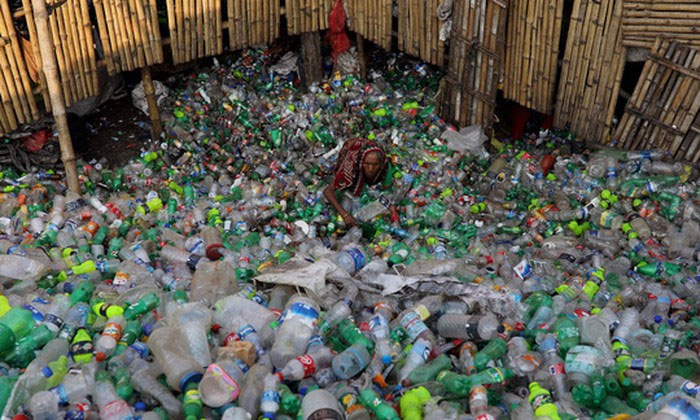First detected human body
The latest study from a group of scientists led by Philipp Schwabl of Vienna Medical University (Austria) gives an unexpected result: The human body can hold up to 9 different types of plastic, most likely from the pack. food packaging.
This is the first time scientists have discovered plastic entering the human body, while many previous studies have shown "invasive" plastic species .
According to the Guardian newspaper (UK), scientists tested feces of 8 volunteers in the UK, Finland, Italy, Japan, the Netherlands, Poland, Russia and Austria. As a result, all test samples contain microplastic - micro plastic particles less than 5 mm in size used in products such as cosmetics but also because of larger pieces of plastic (usually on the sea). disintegrated.

A woman works in a plastic bottle recycling plant in the capital Dhaka - Bangladesh.(Photo: REUTERS).
According to the study, an average of 10 g of feces each contains 20 micro-plastic beads. In total, the authors listed nine types of plastic beads ranging from 50-500 micrometres (1 micron = 0.001 mm), most commonly polypropylene (PP) and polyethylene terephthalate (PET) commonly found in food packaging. to drink.
Based on this study, the authors estimate that more than 50% of the world's population may contain micro plastic particles in their feces even though they think larger studies are needed to confirm.
Emphasizing that this is the first study to confirm what many scientists have been skeptical for a long time, Schwabl highlighted the ominous risk of microscopic plastic beads for humans, especially those with gastrointestinal disease."Micro particles can penetrate blood vessels, lymphatic systems, even to the liver," warns Schwabl.
In addition, researchers added that the plastic granules in the intestine can affect the immune response of the digestive system or facilitate the mechanism of transmission of toxic chemicals and pathogens.
In the study, scientists did not trace the plastic particles. However, the volunteers' eating diaries show that they all use food and drinks in plastic; No one is vegetarian and six people regularly eat sea fish.
Plastics are in widespread use and removing it completely from the food chain is a very difficult task. Every minute around the world, about 1 million plastic bottles are consumed and this number is expected to increase by more than 20% by 2021.
Many routes are being rushed to prevent the increase of plastic pollution. Of which, 8 tons of plastic dumped into the sea each year is one of the goals to repel the United Nations' plastic waste curbing campaigns and many environmental protection organizations.
- Amazing discovery of the human body
- 20 great things about the human body
- 5 questions without answers about the human body
- Amazing things about the human body
- 26 extremely special things about the human body
- Extremely interesting images of the human body
- 20 somewhat horrifying truths related to the human body
- Science says: More than half of your body is not human!
- 7 surprising facts about your body help you explain many things in life
- Horrors of insects cause deformities of the human body
- Scientists found a new organ in the human body
- The truth 'silly' is not everyone knows about his body
 'Fine laughs' - Scary and painful torture in ancient times
'Fine laughs' - Scary and painful torture in ancient times The sequence of numbers 142857 of the Egyptian pyramids is known as the strangest number in the world - Why?
The sequence of numbers 142857 of the Egyptian pyramids is known as the strangest number in the world - Why? History of the iron
History of the iron What is alum?
What is alum?